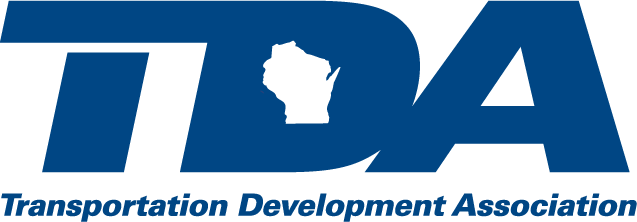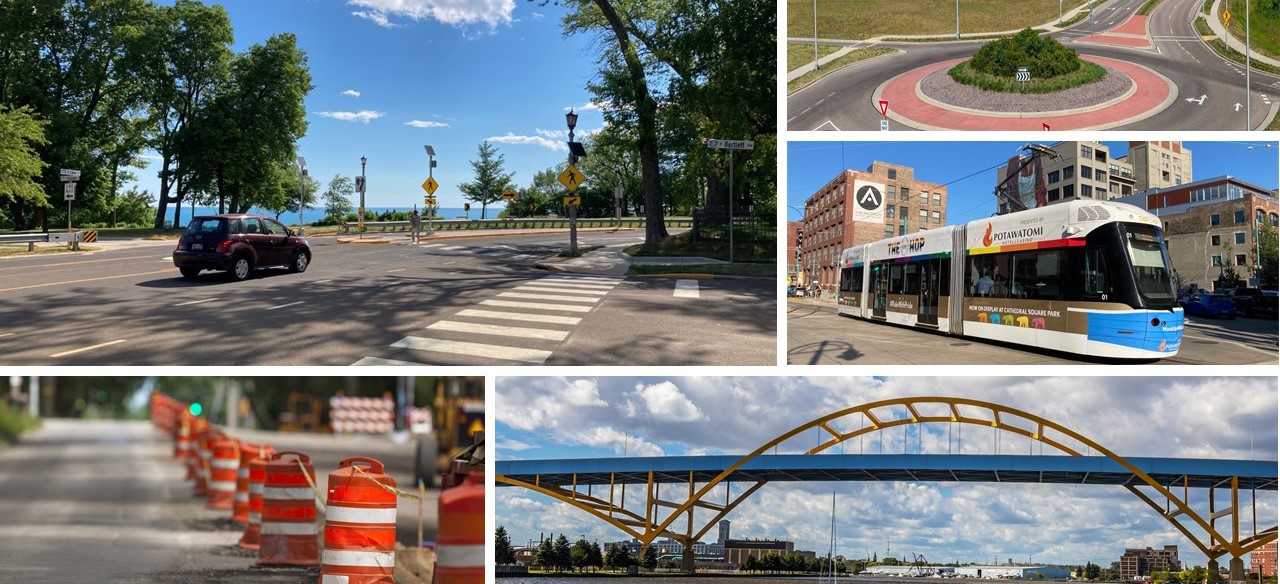Co-hosts:
UWM Institute for Physical Infrastructure and Transportation
Wisconsin Department of Transportation
Friday, October 6, 2023 – 7:45 a.m. to 2:30 p.m.
UWM Student Union – Ballroom
2200 E. Kenwood Blvd.
- Bringing academics, students and practitioners together to network and share information on topics of interest to transportation professionals in southeastern Wisconsin and beyond.
- Showcasing practical applications of transportation related academic research.
- Providing an opportunity for Wisconsin DOT and other presenters to share their innovative practices with the broader transportation community.
- Registration closed Friday, September 22, 2023 at 5 pm. QUESTIONS? Contact Mark Gottlieb at markgott@uwm.edu.
Schedule
| 7:45 – 8:15 | Registration and Continental Breakfast |
| 8:15 – 8:30 | Welcoming Remarks Kristina Boardman, Deputy Secretary, Wisconsin Department of Transportation Xiao Qin, Director, UWM Institute for Physical Infrastructure and Transportation |
| 8:30 – 9:15 | Keynote Speaker – “Building a Talent Pipeline: All Roads Lead to Partnerships” – Dr. Morna Foy, President, Wisconsin Technical College System |
| 9:15 – 9:30 | Break and Networking |
| 9:30 – 10:45 | Breakout Sessions 1-3 |
| 11:00 – 12:15 | Breakout Sessions 4-5 |
| 12:15 – 1:00 | Lunch with Speaker – Craig Thompson, Secretary, Wisconsin Department of Transportation |
| 1:00 – 2:30 | Interactive Workshop: “Developing an Effective Style of Workplace Communication” |
For More Information
Mark Gottlieb
markgott@uwm.edu
414-828-9846
markgott@uwm.edu
414-828-9846
Thanks to our Symposium Sponsors:
Lead Sponsor:

Supporting Sponsors:






Speaker Biographies
Breakout Sessions and Afternoon Workshop
Innovative Projects and Practices (9:30 – 10:45 a.m.) Ballroom East – Moderator Rebecca Burkel, WisDOT
| Topics | Presenter(s) |
|---|---|
| EXPLORE I-794 – Learn how engagement is helping to shape an urban freeway corridor in downtown Milwaukee The Wisconsin Department of Transportation (WisDOT) is conducting a study of I-794 at the Lake Interchange. The study will include development of a purpose and need and concepts that could either reconstruct or remove the freeway. The existing elevated freeway connects the Marquette Interchange to the Hoan Bridge and points to the south including the Port of Milwaukee and south shore communities. I-794 also provides a critical link to Milwaukee jobs, restaurants, businesses, cultural resources, and major tourist destinations in the Third Ward, Lakefront and central business district. The Study will identify a transportation solution that address deteriorating infrastructure in a manner that will improve safety and operations while striving to enhance community connectivity and compatibility with local plans. WisDOT is taking a communication first approach to engage the varied interests of stakeholders who use the Lake Interchange every day. Early activities have included Public Involvement Meetings, community events, stakeholder and business advisory committee meetings, individual stakeholder meetings, local government workshops and elected official briefings. Please join us to for an update on the Study and to explore more about 794. | Mike Ernst (HNTB), Michael Hammond (HNTB) and Dave Pittman (WisDOT) |
| WisDOT Design-Build Pilot Program Evaluation Under legislation adopted in 2019, WisDOT is authorized to award up to six highway or bridge projects under one of three delivery methods: low-bid design build, best-value design build, or fixed-price design build. This session will present the results of IPIT’s evaluation of the Wisconsin Department of Transportation (WisDOT) pilot program for design-build project delivery. The research team reviewed WisDOT’s performance on the first phase of the pilot program, gathered relevant information from agencies around the nation, and interviewed alternative delivery program management staff from four peer states (Arkansas, Colorado, Maryland and Michigan). This presentation will discuss program successes and opportunities for improvement, and recommendations for continued implementation of design-build at WisDOT. | Ben Thompson (WisDOT) and Mark Gottlieb (UWM) |
| Machine Learning and the WisDOT Bicycle and Pedestrian Analysis Support System (BiPass) WisDOT is working on a project we call Bicycle & Pedestrian Project Analysis Support System (BiPASS) that combines travel demand modeling with predictive safety modeling and benefit-cost analysis to provide an integrated suite of tools for project-level evaluation of bicycle and pedestrian improvements. BiPASS will go beyond traditional four-step travel demand models for mobility considerations by a) Using a more integrated model of trip-making to account for a wider range of factors that affect bike and pedestrian trip-making decisions b) Using modern machine learning algorithms to account for greater non-linearity in these factors and their complex interactions BiPASS goes beyond traditional predictive safety models by a) Using modern machine learning algorithms to account for complicated interactions between the roadway, automobile traffic, and bicycle/pedestrian traffic b) Predicting how bicycle and pedestrian crashes will change in response to the ways in which bicycle/pedestrian improvements affect both the roadway and bicycle/pedestrian traffic. | Brian Gaber, Sean Debels and Ethan Frost (WisDOT) |
Research I (Infrastructure) (9:30 – 10:45 a.m.) Room W191 – Moderator Andy Graettinger, UWM
| Topics | Presenter(s) |
|---|---|
| Wisconsin Highway Research Program Current Research Learn more about the Wisconsin Highway Research Program (WHRP) and its latest research in the four main areas of focus: Geotechnics, Rigid Pavements, Flexible Pavements, and Structures. The Wisconsin Highway Research Program was established in 1998 by the WisDOT in collaboration with the University of Wisconsin-Madison to discover better ways to design, build, and reconstruct the state’s highways. WHRP research projects are selected and overseen by committees comprising WisDOT, academics, industry experts, consulting engineers, and the Federal Highway Administration. Through rigorous testing of innovative materials and methods, WHRP research leads to improved performance and service life of Wisconsin’s transportation system. The ultimate goal is to conduct practical research that produces implementable results. | WHRP Technical Committee Chairs (WisDOT) |
| Ultra-High Performance Concrete Applications The mechanical properties and durability of Ultra-High-Performance Concrete (UHPC) make it an ideal solution for many applications related to highway infrastructure. UHPC is a steel fiber reinforced, Portland cement-based material that is more constructible, durable, and resilient than conventional concrete. With tensile strengths more than twice conventional concrete and compression strengths at least four times greater it is an ideal material for the world’s most harsh environments. While UHPC has been in the United States since the early 2000s, its use on large scale projects has grown significantly in recent years. Mixer Systems Inc. has worked closely with cement suppliers and contractors developing and testing their mixing equipment to be able to make the most consistent UHPC mix possible, establishing themselves as a leading supplier of mixers and batching equipment for UHPC. In late 2021, UHPC Solutions accepted the challenge of pouring the world’s largest UHPC project – the resurfacing of the top 2” of the Delaware Memorial Bridge which connects the states of Delaware and New Jersey over the Delaware River. Having worked together on several smaller scale UHPC projects, UHPC Solutions collaborated with Mixer Systems to scale up an operation capable of pouring more UHPC on this project than all the UHPC poured in the entire US combined! This presentation shares details of high volume UHPC production and placement and how a 72-year old 8-lane bridge is being refurbished. | Nick Passint (Mixer Systems) |
Research II (Operations) (9:30 – 10:45 a.m.) Fireside Lounge – Moderator Xiao Qin, UWM
| Topics | Presenter(s) |
|---|---|
| Local Bridge Improvement Assistance Pilot Program In 2019, a pilot program was initiated by the Wisconsin Department of Transportation (WisDOT) in consultation with the Wisconsin County Highway Association (WCHA) to streamline the delivery and oversight of Low-Risk local bridge projects. The goal of this study was to evaluate the Low-Risk bridge pilot program and make recommendations based on sixteen pilot projects and fifty control projects in Wisconsin. | Habib Tabatabai (UWM) and Brandon Lamers (WisDOT) |
| Telematics Data Applications for Transportation Operations and Management The increasing availability of vehicle telematics data presents a low-hanging opportunity to accurately analyze individual vehicle behaviors and perceive surrounding environments under various conditions. This talk will discuss rising opportunities of utilizing telematics data for transportation system management, including predictive warnings, incident management, and asset inspections. Recommendations for possible implementations in the State of Wisconsin will be discussed. | Xiaopeng Li (UW-Madison) |
| Mitigating the Risks of Cybersecurity Threats to the Transportation System In this presentation, we will explore the evolving landscape of cybersecurity threats targeting our transportation systems. As our transportation infrastructure becomes increasingly interconnected, its vulnerability to cyber-attacks increases. We will examine the potential vulnerabilities, real-world consequences of successful attacks, and steps to mitigate these risks. Furthermore, we will discuss strategies to fortify our transportation systems against cyber threats and ensure a secure, resilient environment for the future. | Zhen Zeng (UWM) |
Safety (11:00 a.m. – 12:15 p.m.) Room W191 – Moderator Casey Newman, WisDOT
| Topics | Presenter(s) |
|---|---|
| Traffic Impacts of Automated Driving Features – Evidence from Field Experiments A presentation on field experiments that were developed to study the traffic impacts of ACC systems from both macroscopic and microscopic perspectives. | Xiaowei Shi (UWM) |
| Roadway Departure Safety – High Friction Surface Treatments Come and learn how Community Maps can help identify locations for lane departure crashes and apply the Safe System Approach to address safety issues in your community. | Andrea Bill (UW TOPS Lab) and Mike Finkenbinder (WisDOT) |
| Vision Zero Milwaukee – Milwaukee’s Approach to Eliminating Fatal and Severe Crashes In June 2022, Mayor Johnson and the Common Council committed to reaching zero fatalities and severe injuries on City of Milwaukee streets by 2037. This session will provide a comprehensive look at how the 3 E’s (engineering, education and enforcement) are being used together by various agencies within the city to meet this goal. | Kevin Muhs and Jessica Wineberg (City of Milwaukee) |
Mobility, Sustainability and Equity (11:00 a.m. – 12:15 p.m.) Fireside Lounge – Moderator Lea Collins-Worachek, WisDOT
| Topics | Presenter(s) |
|---|---|
| Maximization of Disadvantaged Business Participation Through collaboration with the Wisconsin Department of Transportation (WisDOT), a research team from the Institute for Physical Infrastructure and Transportation (IPIT), at the University of Wisconsin-Milwaukee (UWM), completed a recent study to determine how the Department can maximize participation of the Disadvantaged Business Enterprise (DBE) in the state. The study evaluated the WisDOT’s DBE operation, reviewed available literature, and conducted a series of surveys and interviews of different state DOTs and Wisconsin DBE stakeholders. The study led to identifying the barriers DBEs face and methods to remedy or remove such barriers. The study made recommendations, including conducting a pilot study, to enhance DBEs’ qualifications and maximize DBE participation in the Department’s DBE contracts and support services. | Madalena Maestri (WisDOT) and Al Ghorbanpoor (UWM) |
| Wisconsin Workforce Innovation Grant – Waupaca County Make the Ride Happen Waupaca County Economic Development Corporation partnered with Make the Ride Happen and Feonix – Mobility Rising to launch mobility as a service as well as a rural microtransit service to solve transportation challenges for access to employment. Funding was provided for the program by the Governor’s Workforce Innovation Grant Program in July of 2022. Together with state leadership, community partners, employers, elected officials, and a lot of hard work, they were able to provide over 1,000 rides to work in less than 6 months from their first trip, and since then have continued to experience exponential growth. Within the first year, they have learned some very interesting trends in the trip demand, such as peak ridership at 4-5 am and 10-11 pm. In addition, approximately 20% of ridership comes from outside of the county to access jobs within the communities of Waupaca County. As part of the program riders who have a household income under 250% of the Federal Poverty Line qualify for reduced cost rides and receive a wrap-around supportive needs assessment to ensure access to resources for all social determinants of health. | Holly Keenan (LSSWIS) and Valerie Lefler (Feonix Mobility Rising) |
| Milwaukee BikeShare and Micro-Mobility Learn about Milwaukee’s BikeShare program (Bublr Bikes) and how it fits into the overall theme of micromobility and the interaction of different modes to provide mobility options for everyone. | James Davies and Aaron Arteaga-Martinez (Bublr Bikes) |
Interactive Workshop: “Developing an Effective Style of Workplace Communication” (1:00 – 2:30 p.m.) Ballroom East
| Topics | Presenter(s) |
|---|---|
| Recognizing that all of us don’t think, work or communicate in the same way is critical to effective leadership. In this interactive session, we’ll identify several distinct communication styles, their characteristics, and impacts to decision-making in a workforce with changing needs and expectations. You’ll identify your own communication style and learn how to use that knowledge to work more effectively with colleagues or clients. This session will be led by Wendy Kamerling and Michael Markiewicz. Wendy is an executive coach and business consultant with a wealth of executive level HR experience. As adjunct faculty with UWM Lubar College of Business Executive Programs, Wendy has worked with employees of premier companies across southeastern Wisconsin as they hone their leadership skills. Michael is the Director of Executive Programs at the Lubar College of Business and leads the design and delivery of non-degree executive and management education programs. | Mike Markiewicz and Wendy Kamerling |
